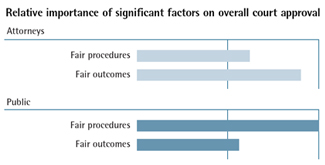 |
While the public focuses on fairness of the process, judges and lawyers tend to focus on fair outcomes, often at the expense of meeting the criteria of procedural fairness that are critical to public perceptions of the courts. The graphic to the left, provided in the report of California's separate 2005 surveys of attorneys and the general public, aptly demonstrates the different ways in which these two groups look at the importance of procedural fairness and outcome fairness. David B. Rottman, Trust and Confidence in the California Courts: A Survey of the Public and Attorneys 25 (2005). |
Procedural fairness is an evidence-based practice increasingly implemented by law enforcement, the judiciary, and other parts of the criminal justice system. Research demonstrates that adhering to procedural fairness principles increases both satisfaction with the courts and compliance with court orders. Particularly relevant studies include a statewide survey like the 2005 California Judicial Council study of "Public Trust and Confidence in the California Courts." The California Judicial Council in 2006 released another report based on focus groups commissioned to add texture and depth to findings from the previous state survey by hearing from court users in their own voices.
Overall, a very large body of research, conducted over more than 35 years and in hundreds of settings, attests to the benefits of adopting policies and practices informed by procedural fairness principles. A sample of that research conducted in or about the state courts can be found by clicking on the links below.
